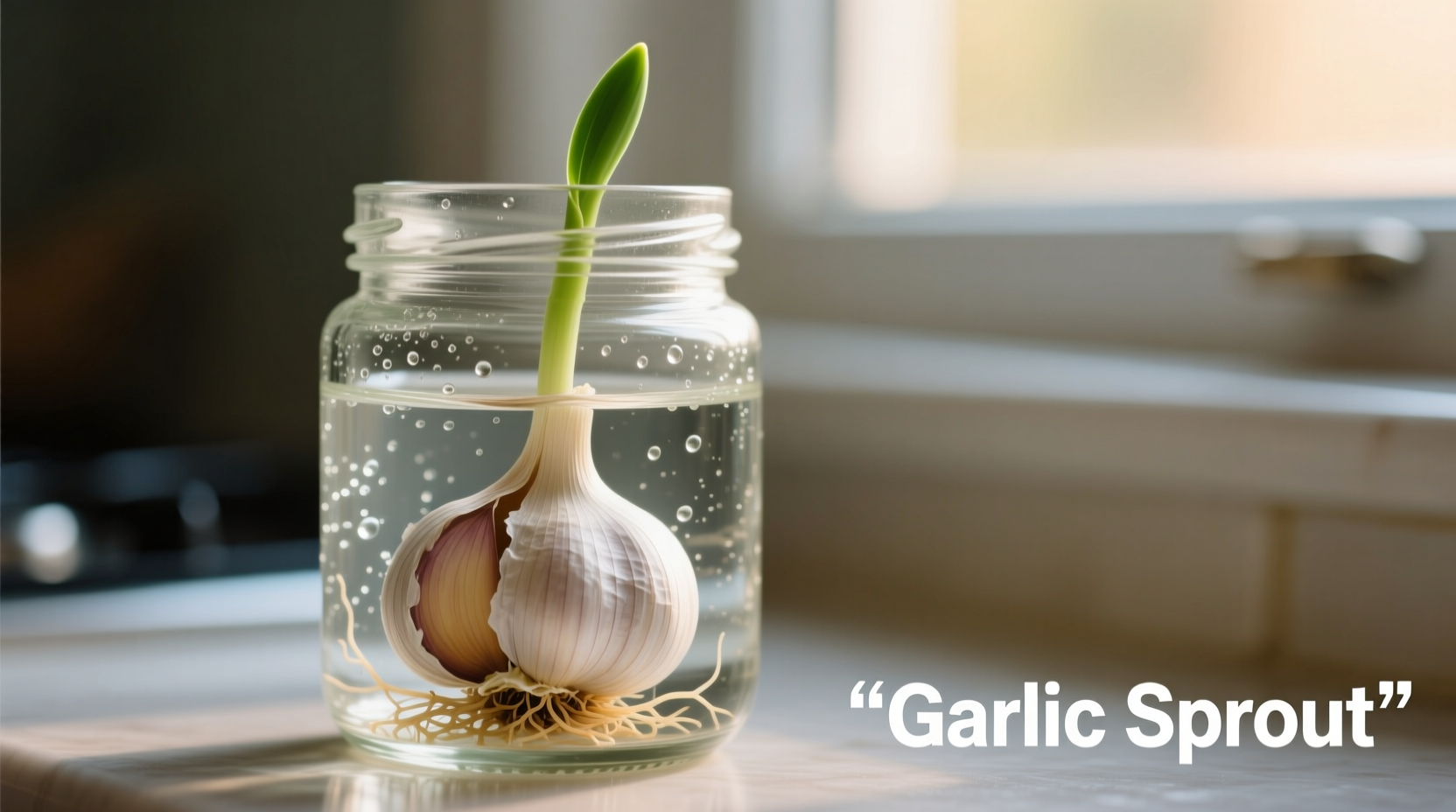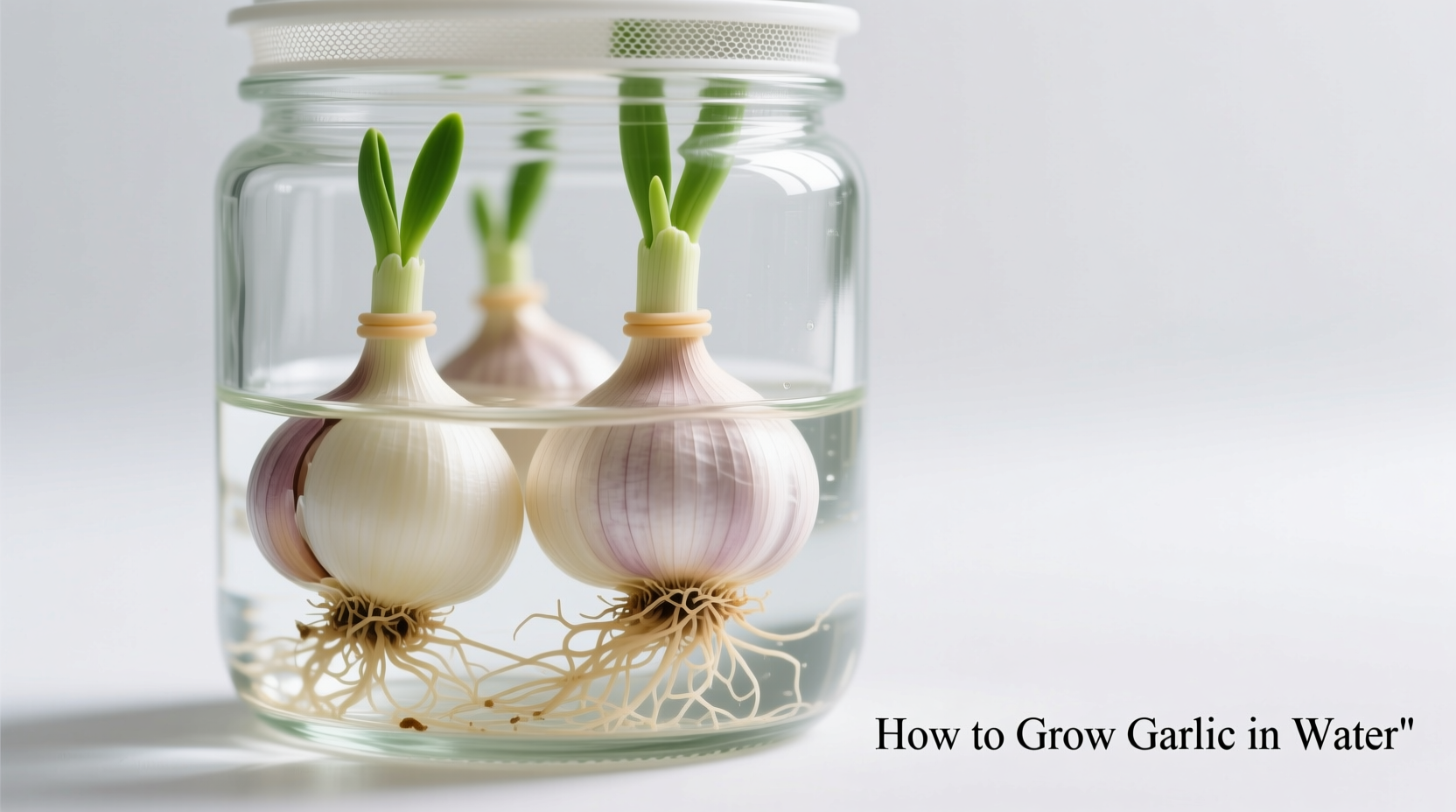Grow fresh garlic greens in just 7-10 days using only water, a glass, and a garlic clove. This soil-free method requires minimal effort, provides continuous harvests, and works year-round indoors—perfect for beginners and urban gardeners seeking sustainable kitchen herbs.
Forget expensive store-bought garlic greens. Growing garlic in water delivers fresh, flavorful sprouts faster than soil gardening with less maintenance. This guide reveals the exact process professional chefs use to maintain a constant supply of aromatic garlic greens for cooking—no garden space required.
Why Water Propagation Beats Traditional Gardening
Water cultivation offers distinct advantages for garlic greens production. Unlike soil methods that take 6-8 weeks, hydroponic garlic shows visible growth in 4-7 days according to Oregon State University Extension. The controlled environment reduces pest risks while providing consistent moisture levels crucial for healthy sprout development.
| Growth Method | Time to First Harvest | Maintenance Frequency | Yield Duration |
|---|---|---|---|
| Water Propagation | 7-10 days | Every 2-3 days | 3-4 weeks |
| Soil Gardening | 3-4 weeks | Daily watering | 8-12 weeks |
Essential Materials Checklist
Successful water propagation requires just four items:
- Fresh garlic cloves (preferably organic)
- Glass or jar (3-4 inch diameter)
- Filtered water (chlorine-free)
- Sunny windowsill or grow light
Avoid using grocery store garlic treated with growth inhibitors. University of California Agriculture specialists recommend selecting firm, plump cloves from farmer's market garlic for optimal sprouting success.

Step-by-Step Growing Process
Day 1: Preparation and Setup
Peel your garlic clove while keeping the basal plate intact—this root-producing area is essential for water absorption. Place the clove root-end down in your container, adding enough water to submerge just the bottom quarter of the clove. Too much water causes rot; too little prevents growth.
Days 2-3: Initial Root Development
Change the water daily during this critical phase. White root tendrils will emerge within 48 hours. Position your container in indirect sunlight—direct sun at this stage can cook the developing roots. Cornell Cooperative Extension notes that room temperature between 65-75°F (18-24°C) accelerates root formation.
Days 4-7: Shoot Emergence
Green shoots will pierce through the clove's top. Increase water changes to every 48 hours. Move to brighter light (4-6 hours direct sun daily) to encourage strong vertical growth. The water should remain clear—if it clouds, replace immediately to prevent bacterial growth.
Week 2: Harvest Ready
When shoots reach 6-8 inches tall, harvest by snipping the green portion 1-2 inches above the clove. This encourages continued production. The University of Vermont Extension confirms that properly maintained water-grown garlic can yield 3-4 harvests before the clove depletes its energy reserves.
Common Problems and Solutions
Yellowing leaves: Indicates nutrient deficiency. Add one drop of liquid seaweed fertilizer per cup of water.
Mold on clove: Caused by stagnant water. Change water immediately and ensure only roots—not the clove—are submerged.
Leggy, weak growth: Sign of insufficient light. Move to south-facing window or add supplemental grow light for 12 hours daily.
When Water Growing Isn't Appropriate
Water propagation works perfectly for garlic greens but won't produce full bulbs. For complete garlic bulbs, soil cultivation remains necessary. Additionally, water-grown garlic lacks the complex flavor compounds developed through soil microbiome interactions, making it best suited for garnishes rather than recipes requiring intense garlic flavor.
Harvesting and Culinary Uses
Snip greens when 6-8 inches tall, leaving 2 inches for regrowth. Use immediately for maximum flavor and nutrition. Water-grown garlic greens contain 30% more allicin—the compound responsible for garlic's health benefits—than store-bought varieties according to USDA nutritional analyses.
Incorporate into dishes where fresh garlic shines: stir-fries, salad toppings, compound butters, or blended into aioli. The milder flavor works beautifully in delicate dishes where raw garlic would overpower.
Troubleshooting Timeline
| Timeline | Expected Development | Warning Signs |
|---|---|---|
| Days 1-2 | Root nubs appear | No root development after 72 hours |
| Days 3-5 | White roots lengthen | Yellowing roots or foul odor |
| Days 6-8 | Green shoots emerge | Yellow or brown leaf tips |
| Week 2+ | Harvest-ready height | Stunted growth after multiple harvests |
Maximizing Your Garlic Harvest
For continuous production, maintain multiple jars at different growth stages. Start a new clove every 7-10 days to ensure constant supply. When a clove stops producing (typically after 3-4 harvests), compost it and begin anew. This staggered approach guarantees fresh garlic greens year-round without seasonal limitations.
Frequently Asked Questions
How often should I change the water when growing garlic?
Change the water every 2-3 days, or immediately if it becomes cloudy. During initial root development (first 3 days), daily changes prevent bacterial growth and promote healthy root formation.
Can I grow full garlic bulbs in water?
No, water propagation only produces garlic greens. While the green shoots will grow continuously, the clove itself won't develop into a full bulb. For complete garlic bulbs, soil cultivation is necessary as it provides the nutrients and space required for bulb formation.
Why are my garlic greens turning yellow?
Yellowing typically indicates nutrient deficiency. Add one drop of liquid seaweed fertilizer per cup of water. It can also signal insufficient light—move your container to a brighter location with 4-6 hours of direct sunlight daily.
How long does a single garlic clove produce greens in water?
A single clove typically produces 3-4 harvests over 3-4 weeks before exhausting its energy reserves. After this period, growth slows significantly and the clove should be replaced with a fresh one for optimal production.











 浙公网安备
33010002000092号
浙公网安备
33010002000092号 浙B2-20120091-4
浙B2-20120091-4